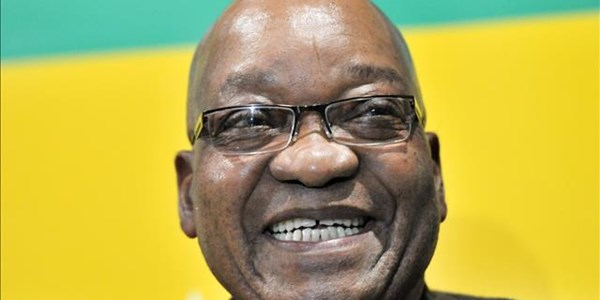National
SA President Zuma says private sector expected to share and transfer economic ownership to blacks─── 11:14 Wed, 28 Sep 2016

Johannesburg - President Jacob Zuma told a gathering of black business people it was expected that the private sector would transfer skills and economic ownership and control to them.
Speaking at the Black Business Council (BBC) Awards Gala Dinner in Sandton on Tuesday Zuma said: “The private sector is expected to share and transfer economic ownership, control and the necessary skills and capabilities to black people”.
The gathering included BBC president, Dr Danisa Baloyi, billionaire businessman Patrice Motsepe, cabinet ministers Lindiwe Zulu, Malusi Gigaba and Nathi Mthethwa as well as African Nation Congress Treasurer (ANC) General Dr Zweli Mkhize.
Zuma said: “Our black economic empowerment and affirmative action policies must open doors and remove impediments, both historical and current, visible and invisible, which inhibit the Black majority from participating and benefiting from the activities of the economy”.
He said for the country to succeed, both the public and the private sectors need to institutionalise the policy and implement it.
“We are impressed by the cooperation of the international investor community. We have found that most investors only want certainty and clarity. They want to know how the policy works and what is expected from them. They are not opposed to reversing the legacy of the apartheid past.”
Zuma said the BBC has an important role to play in championing economic transformation in South Africa.
“You have a responsibility to work with the democratic state to ensure that the objectives that guided our struggle for liberation are met,” said the President.
“This evening you have decided to honour trailblazers and outstanding black leaders who have played a prominent role in opening up the space for black people to enter the business arena. In this way, you have reminded us of the progress that has been made against all odds by black entrepreneurs.”
He said for any economy to succeed the majority of the citizens must play a “meaningful role” beyond being workers. They must participate also as owners, executives and senior managers and also as policy makers in the economy.
Zuma said since coming to power in 1994, the ANC government recognised the imperative to de-racialise the ownership and control of the economy.
“The guide in this regard is the clarion call in the Freedom Charter that the People Shall Share in the Country’s Wealth. We are guided by the need to promote inclusive growth and to create decent employment. We also need to eliminate poverty and deal decisively with extreme inequalities in our society.”
Zuma said as part of promoting economic transformation and inclusive growth, the Broad Based Black Economic Empowerment (B-BBEE) policy was designed and is being implemented.
He said the B-BBEE policy was not designed “just for government to say it is doing something”.
“Our black economic empowerment and affirmative action policies must open doors and remove impediments, both historical and current, visible and invisible, which inhibit the Black majority from participating and benefiting from the activities of the economy.”
Zuma said for the BBBEE policy to succeed in the public sector, government must use its procurement muscle to sustain and grow black businesses.
Annually, through the public sector procurement system, government spends about 500 billion rand on goods and services and construction works alone.
“In this regard, the buying power of the state is a powerful economic transformation tool. It can and must be used to advance black economic empowerment.”
Zuma said in the past five years, as part of advancing BBBEE procurement, government amended the Preferential Procurement Policy Framework Act (PPPFA) to provide for Black Economic Empowerment (BEE) preference points.
“We thought this would work and would make an impact. However, you pointed out that it does not work. We are now aware of the shortcomings. We agree that the BEE preference points system prescribed in the PPPFA is rigid and is not responsive to government objectives,” said Zuma.
“Due to the shortcomings, the preferential procurement regulations have failed to substantially re-shape the skewed ownership and control of the South African economy.”
He said it was the intention of government to repeal the PPPFA and to introduce a more flexible preferential procurement framework that is responsive to government objectives.
“In this regard, the Preferential Procurement Policy Framework Act will be repealed by the Public Procurement Act. The Public Procurement Bill is now going through the different government stakeholder engagement processes before it is tabled in Parliament. This is targeted for early 2017. I trust that the BBC has made its inputs to the National Treasury.”
He said in the interim, government is to produce regulations that will improve the PPPFA to make them more responsive to the economic transformation imperatives. One of the main changes contained in the proposed new Preferential Procurement Regulations is the introduction of a compulsory sub-contracting clause.
“It will be compulsory to sub-contract a minimum of 30% of the value of the contract for all contracts above 30 million rand, to small and emerging enterprises owned by the women, youth, black people or persons with disability,” said Zuma.
“We have located the implementation of the policy on the 30 percent set aside of the public procurement budget for small business in a workstream led by the minister of small business development. The BBC may want to focus on specific high-value sectors where it wants to break the prevailing dominance patterns, in taking advantage of the set-asides.
“The intention is to finalise the Preferential Procurement Regulations for approval during October 2016, and for these to be promulgated by 1 November 2016.”
Zuma said the government was also reviewing the National Small Business Act.
He said the government was inviting black business to work with the small business department to ensure that the Amendment Bill supports the creation of a thriving environment for small business.
“One of the biggest challenges facing black businesses and the implementation of our empowerment policies is access to finance. To address this challenge we established the National Empowerment Fund (NEF) to be used as an instrument to financially support empowerment initiatives.”
Since its inception, the number of approvals by the National Empowerment Fund (NEF) have totalled 7.6 billion rand, supporting seven hundred and seventy (770) black businesses. For the 2015/16 financial year, the NEF has approved one hundred and twenty deals worth 1.3 billion rand.
“The NEF needs to be supported in order for the institution to do more to ensure access to finance by black entrepreneurs. Government is currently exploring various means to recapitalize the NEF as an apex institution to facilitate BEE finance.
“I am sure that we are all in agreement that all development finance institutions must be used as vehicles of economic transformation. Within the Public Investment Corporation fold, the Government Employees Pension Fund has allocated a further 70 billion rand, while the Unemployment Insurance Fund increased its allocation to 25 billion rand towards developmental investments.”
The IDC has provided 31 billion rand over the past five years to companies that are black-empowered. The IDC has also allocated 23 billion rand to the black industrialist programme, which was established recently.
In its first year of roll-out, the Department of Trade and Industry has approved 22 Black Industrialist projects with a total value of 1.2 billion rand.
Zuma said more than 1,000 direct jobs have been supported. “We thank you for supporting this programme, and we acknowledge the support of big business as well.
“Let me also use this opportunity to urge the Black Business Council to join government in campaigning against the practice of fronting.”
He said fronting undermines black economic empowerment by creating a false sense of achievement.
Zuma also revealed that the newly-established Broad-Based Black Economic Empowerment Commission has to date received 118 complaints, specifically pertaining to fronting.
He said investigations were in progress and the B-BBEE Commission will issue reports in due course.
The President said: “We are doing well in our country currently in promoting cooperation between government and business. This positive collaboration also needs to include the promotion of transformation. It must go beyond reigniting growth and staving off a ratings downgrade.”
“We will also continue working with labour and the community sector to ensure that the clauses that are in the Freedom Charter are achieved.
“Indeed, the struggle for economic inclusion continues in earnest. With your support, and working together, we will succeed,” said Zuma.
ANA














